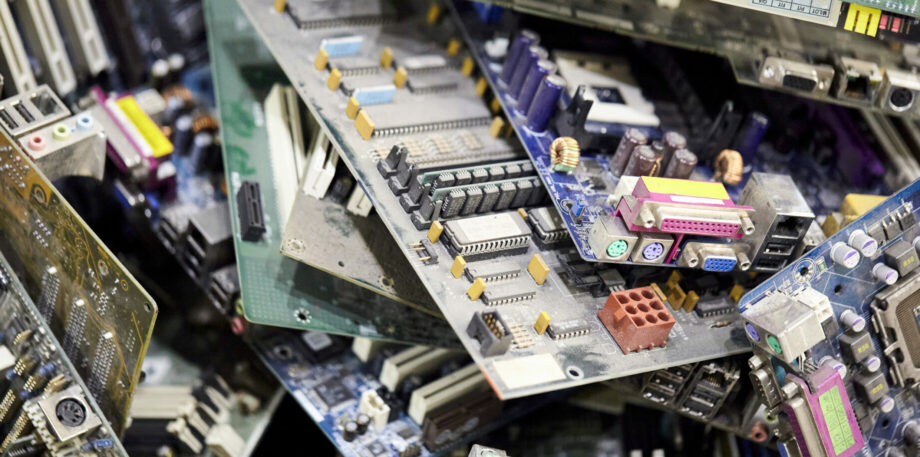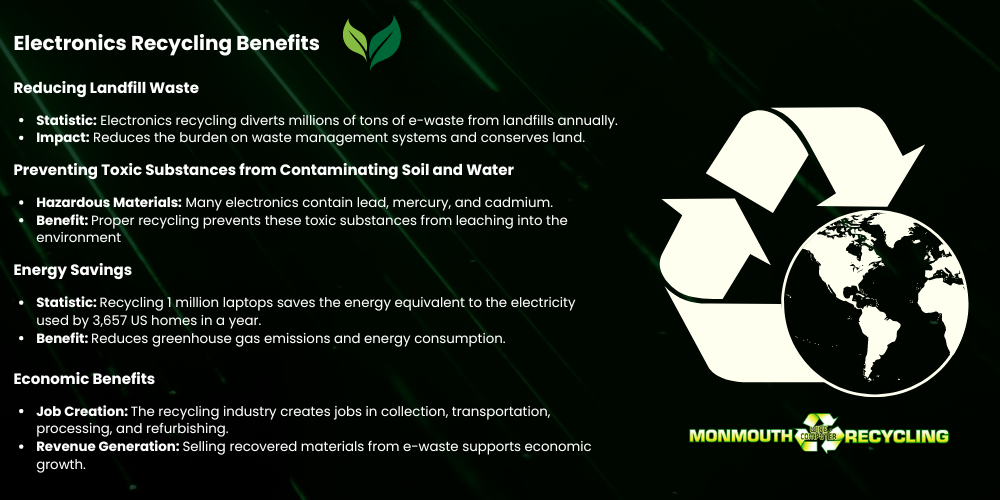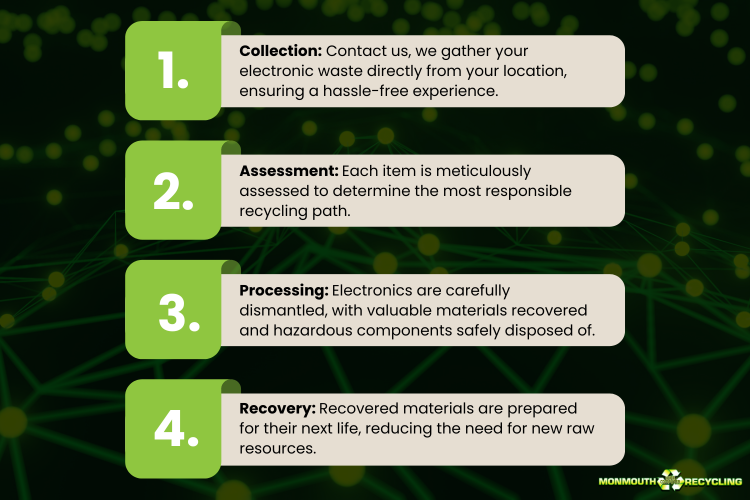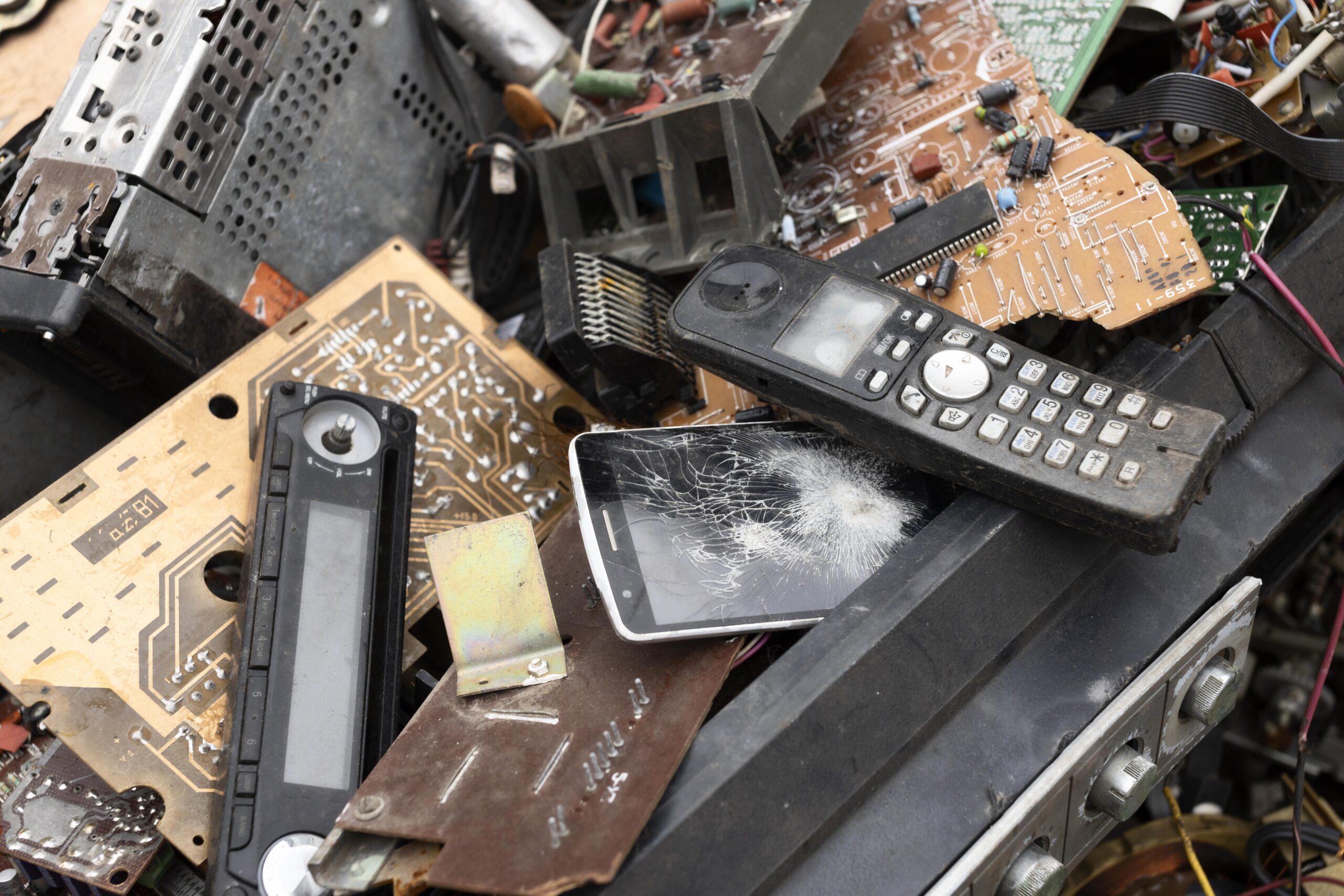Overview of Electronic Waste (E-Waste) and Its Environmental Impact
Electronic waste, or e-waste, refers to discarded electronic devices and components. The rapid growth of technology has led to an increase in e-waste, which poses significant environmental hazards. Improper disposal of electronics can lead to the release of toxic substances, such as lead and mercury, contaminating soil and water, and harming wildlife and human health.
According to the Global E-Waste Monitor 2024, the annual generation of e-waste is rising by 2.6 million tonnes annually and is on track to reach 82 million tonnes by 2030, representing a further 33% increase from the 2022 figure .

Importance of Recycling Electronics
Recycling electronics is crucial for reducing the environmental impact of e-waste. By recycling, valuable materials like metals, plastics, and glass can be recovered and reused, conserving natural resources and reducing the need for raw material extraction. Additionally, recycling helps prevent hazardous substances from entering the environment, promoting a healthier ecosystem.
Brief Introduction to the Types of Electronics That Can Be Recycled
A wide range of electronic devices can be recycled, from consumer electronics like smartphones and laptops to household appliances and industrial equipment. Understanding what electronics can be recycled helps individuals and organizations make informed decisions about proper disposal and recycling practices.
Categories of Recyclable Electronics
Consumer Electronics
Computers and Laptops
- Examples: Whole computers, laptops, monitors, keyboards, mice.
- Recycling Components: Hard drives, power supplies, CPUs.
Televisions
- Examples: Flat screens, CRT TVs, wooden consoles, large projection TVs, remotes.
- Recycling Components: Screens, plastic, metal.
Audio and Video Equipment
- Examples: Radios, stereo components, speakers, VCRs, DVD players.
- Recycling Components: Circuit boards, wiring, plastic casings.
Cameras and Video Equipment
- Examples: Cameras, video equipment, telescopes.
- Recycling Components: Lenses, electronic parts, batteries.
Household Appliances
Small Appliances
- Examples: Microwaves, air conditioners.
- Recycling Components: Metal, plastic, electronic parts.
Large Appliances
- Examples: Refrigerators, washing machines, ovens.
- Recycling Components: Metal, plastic, motors, electronic controls.
Office and Business Equipment
Printers and Scanners
- Examples: Home printers, office printers, fax machines, copiers, scanners.
- Recycling Components: Plastic, metal, ink cartridges, electronic parts.
Networking Equipment
- Examples: Mainframes, servers, switches, hubs, modems.
- Recycling Components: Circuit boards, casings, wiring.
Telecom and Security Equipment
Telecom Equipment
- Examples: Telephones, cell phones, answering machines.
- Recycling Components: Batteries, circuit boards, plastic casings.
Security Equipment
- Examples: Various security devices.
- Recycling Components: Electronic parts, metal, plastic.
Industrial and Medical Equipment
Medical Equipment
- Examples: Laboratory equipment, diagnostic machines, x-rays.
- Recycling Components: Electronic parts, plastic, metal.
Industrial Electronics
- Examples: Test equipment, R&D equipment.
- Recycling Components: Metal, electronic parts.
Other Recyclable Items
Battery Backups and Batteries
- Examples: UPS, rechargeable batteries.
- Recycling Components: Lead, acid, metal.
Wire and Cables
- Examples: All types of wire and cables.
- Recycling Components: Copper, insulation materials.
Miscellaneous Metals
- Examples: Copper, brass, steel, aluminum siding, cans.
- Recycling Components: Various metals.
Benefits of Recycling Electronics

Environmental Protection
Reducing Landfill Waste
One of the primary benefits of recycling electronics is the significant reduction in landfill waste. By recycling, electronic devices are diverted from landfills, where they would otherwise take up valuable space and contribute to the growing waste problem. This helps conserve land and reduces the burden on waste management systems.
Preventing Toxic Substances from Contaminating Soil and Water
Many electronics contain hazardous materials such as lead, mercury, and cadmium. When improperly disposed of in landfills, these toxic substances can leach into the soil and water, causing environmental contamination. Recycling electronics ensures that these harmful materials are properly handled and disposed of, preventing environmental pollution and protecting ecosystems.
Resource Conservation
Recovering Valuable Materials (e.g., Gold, Silver, Copper)
Electronics are rich in valuable materials like gold, silver, copper, and rare earth elements. Recycling allows these precious resources to be recovered and reused, reducing the need for new mining and extraction processes. This conservation of resources helps preserve natural habitats and reduces the environmental impact of mining activities.
Reducing the Need for Raw Material Extraction
By recycling electronics, we can reduce the demand for raw materials needed to manufacture new devices. This not only conserves finite natural resources but also decreases the environmental impact associated with the extraction, processing, and transportation of these materials. Recycling supports a more sustainable and circular economy.
Economic Benefits of Electronics Recycling
Creating Jobs in the Recycling Industry
The recycling industry plays a crucial role in creating employment opportunities. From collection and transportation to processing and refurbishing, various jobs are generated at different stages of the recycling process. These jobs contribute to local economies and provide livelihoods for many individuals.
Generating Revenue from Recycled Materials
Recycling electronics can be financially beneficial as well. The recovered materials from recycled electronics can be sold and reused in the production of new devices, generating revenue. This economic incentive encourages more businesses and individuals to participate in recycling programs, further supporting environmental and economic sustainability.
How to Recycle Electronics

Finding Recycling Centers
Local Recycling Programs
Many communities offer local recycling programs that accept electronic waste. These programs often have designated drop-off locations or scheduled collection events where residents can safely dispose of their electronics. Checking with local waste management services can provide information on available recycling options. Check out our page that details our own Municipality Recycling Programs.
Manufacturer Take-Back Programs
Some electronics manufacturers have take-back programs where consumers can return their old devices for recycling. These programs are often free of charge and ensure that the electronics are properly recycled by the manufacturers. Checking the manufacturer’s website or contacting customer service can provide details on available take-back programs.
Specialized E-Waste Recycling Facilities
Specialized e-waste recycling facilities are equipped to handle various types of electronic waste. These facilities use advanced technologies to safely dismantle and recycle electronic devices, recovering valuable materials and properly disposing of hazardous substances. Locating a nearby e-waste recycling facility can ensure responsible recycling of electronics.
Preparing Electronics for Recycling
Removing Personal Data
Before recycling any electronic device, it is essential to remove all personal data to protect privacy. This includes performing a factory reset on devices like smartphones and tablets, securely wiping hard drives on computers, and removing memory cards and SIM cards. Many recycling programs and manufacturers provide guidelines on how to safely erase data. Take a look at our guide that details the importance of data destruction.
Disassembling or Sorting Components if Required
Some recycling programs may require electronics to be disassembled or components to be sorted before drop-off. This helps streamline the recycling process and ensures that different materials are processed correctly. Checking the requirements of the chosen recycling program can provide guidance on any necessary preparations.
Participating in E-Waste Collection Events
Community Collection Drives
Community collection drives are organized events where residents can bring their electronic waste for recycling. These events are often held in collaboration with local governments, non-profits, or recycling companies. Participating in these drives provides a convenient way to recycle electronics and support community-wide recycling efforts.
Scheduled Drop-Off Events
Scheduled drop-off events are specific times and locations designated for e-waste collection. These events are usually advertised in advance and provide an opportunity for individuals to dispose of their electronic waste responsibly. Keeping an eye out for announcements from local authorities or recycling organizations can help stay informed about upcoming drop-off events.
Challenges in Electronics Recycling
Complexity of Devices
Difficulties in Disassembling and Separating Components
One of the main challenges in determining what electronics can be recycled is the complexity of the devices themselves. Modern electronics are intricate, with numerous small, delicate components that are difficult to disassemble. Separating these components for recycling requires specialized tools and knowledge. The process can be time-consuming and labor-intensive, posing a significant hurdle in efficient e-waste recycling.
Hazardous Materials
Handling Toxic Substances Like Lead, Mercury, and Cadmium
Many electronic devices contain hazardous materials such as lead, mercury, and cadmium. Properly handling and disposing of these toxic substances is crucial to prevent environmental contamination. Specialized processes and equipment are necessary to safely manage these materials, making the recycling of certain electronics more challenging. Ensuring that recyclers adhere to safety standards is essential to protect both human health and the environment.
Lack of Awareness
Educating the Public About the Importance and Methods of Recycling
A significant barrier to effective electronics recycling is the lack of public awareness. Many people are unaware of what electronics can be recycled and the importance of doing so. Educating the public about the benefits of e-waste recycling and how to properly dispose of electronic devices is crucial. Increased awareness can lead to higher participation rates in recycling programs and better environmental outcomes.
Recap of the Importance of Recycling Electronics
Recycling electronics is essential for reducing environmental pollution, conserving resources, and supporting economic growth. Understanding what electronics can be recycled helps individuals and organizations make informed decisions, leading to more effective e-waste management.
Encouragement to Take Action and Participate in E-Waste Recycling
Everyone has a role to play in reducing e-waste. By participating in recycling programs and properly disposing of electronic devices, we can collectively make a significant impact. Taking action today ensures a healthier, more sustainable future.
Final Thoughts on Contributing to a Sustainable Future by Recycling Electronics Responsibly
Responsible electronics recycling is a crucial step towards sustainability. By understanding the challenges and benefits of e-waste recycling, we can contribute to protecting our planet.
For all your electronic recycling needs, contact Monmouth Wire & Computer Recycling. Our expert team is ready to assist you in safely and efficiently recycling your electronic devices. Contact us here.

